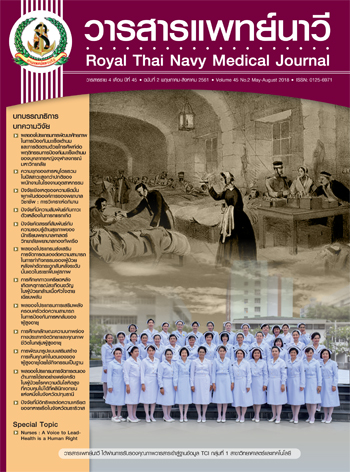The Effect of the Self-Management Program on Functional Ability of Patients with Lumbars Spine Surgery in Rehabilitation
Main Article Content
Abstract
The purpose of this quasi-experimental research was to study the effect of a self-management program on the functional ability of lumbar spine surgery in rehabilitation. The self-management theory was used as a conceptual framework. The sample composed of male and female patients aged between 35 - 59 who had been diagnosed by a physician as having degenerative disease of the lumbar spine L1 - S3 including degenerative lumbar spinal stenosis, lumbar disc herniation, lumbar spondylolisthesis and spondylolysis. The patients were recruited from the orthopedic ward and the neurosurgery ward at the Police General Hospital. The experimental and control groups comprised 22 patients in each group. They were then matched by age and pain scale. The control group received conventional care. The experimental group received the self-management program. The research instrument was the self-management program comprised of five sessions over three weeks. The instrument for collecting data was the function ability and self-management assessment tools which were tested for reliability with Cronbach’s alpha coefficient of 0.73 and 0.80. Data were analyzed using frequency, percentage, mean, standard deviation and t-test. The results revealed that functional ability after lumbar spine surgery in patients receiving the self-management program was significantly higher than the control group at level of .05
Article Details

This work is licensed under a Creative Commons Attribution-NonCommercial-NoDerivatives 4.0 International License.
References
2. สำนักนโยบายและยุทธศาสตร์ สำนักงานปลัดกระทรวงสาธารณสุข. สรุปรายงานการป่วย พ.ศ. 2555. สำนักงานกิจการโรงพิมพ์ องค์การสงเคราะห์ทหารผ่านศึก ในพระบรมราชูปถัมภ์; 2556
3. กรมการแพทย์ กระทรวงสาธารณสุข. รายงานสถิติโรค พ.ศ. 2554. กรุงเทพมหานคร: ศูนย์เทคโนโลยีสารสนเทศและการสื่อสาร กรมการแพทย์ กระทรวงสาธารณสุข; 2554
4. Archer KR, Seebach CL, Mathis SL, Riley LH, Wegener ST. Early postoperative fear of movement predicts pain, disability, and physical health six months after spinal surgery for degenerative conditions. Spine J 2014;14(5):759-67
5. ต่อพงษ์ บุญมาประเสริฐ. โรคกระดูกคอเสื่อม. เชียงใหม่: ภาควิชาออร์โทปิดิกส์ คณะแพทยศาสตร์ มหาวิทยาลัยเชียงใหม่; 2552
6. Hakkinen A, Ylinen J, Kautiainen H, Airaksinen O, Herno A, Tarvainen U, et al. Pain, trunk muscle strength, spine mobility and disability following lumbar disc surgery. J rehabil Med 2003;35(5):236-40
7 Johansson AC, Linton SJ, Rosenblad A, Bergkvist L, Nilsson O. A prospective study of cognitive behavioural factors as predictors of pain, disability and quality of life one year after lumbar disc surgery. Disabil rehabil 2010;32(7):521-9
8. Mayer TG, Mooney V, Gatchel RJ, Barnes D, Terry A, Smith S, et al. Quantifying postoperative deficits of physical function following spinal surgery. Clin Orthop Relat Res 1989;(244):147-57
9. Datta G, Gnanalingham KK, Peterson D, Mendoza N, O’neill K, Van Dellen J, et al. Back pain and disability after lumbar laminectomy: is there a relationship to muscle retraction?. Neurosurgery 2004;54(6):1413-20
10. Archer KR, Wegener ST, Seebach C, Song Y, Skolasky RL, Thornton C, et al. The effect of fear of movement beliefs on pain and disability after surgery for lumbar and cervical degenerative conditions. Spine (Phila Pa 1976) 2011;36(19):1554-62
11. Kanjanapho K. Pain, functional ability, and quality of life in persons with low back pain undergoing epidural steroid injection. [Master’s Thesis, Faculty of Nursing]. Mahidol University; 2009. (in Thai)
12. Aalto TJ, Malmivaara A, Kovacs F, Herno A, Alen M, Salmi L, et al. Preoperative predictors for postoperative clinical outcome in lumbar spinal stenosis: systematic review. Spine (Phila Pa 1976) 2006;31(18):E648-63
13. Kawi J. Self-management and self-management support on functional ablement in chronic low back pain. Pain Manag Nurs 2014;15(1):41-50
14. Archer KR, Seebach CL, Mathis SL, Riley LH, Wegener ST. Early postoperative fear of movement predicts pain, disability, and physical health six months after spinal surgery for degenerative conditions. Spine J 2014;14(5):759-67
15. Filiz M, Cakmak A, Ozcan E. The effectiveness of exercise programmes after lumbar disc surgery: a randomized controlled study. Clin Rehabil 2005;19(1):4-11
16. Abbott AD, Hedlund R, Tyni-lennÉ R. Patients’ experience post-lumbar fusion regarding back problems, recovery and expectations in terms of the international classification of functioning, disability and health. Disabil Rehabil 2011;33(15-16):1399-408
17. Johansson AC, Linton SJ, Rosenblad A, Bergkvist L, Nilsson O. A prospective study of cognitive behavioural factors as predictors of pain, disability and quality of life one year after lumbar disc surgery. Disabil Rehabil 2010;32(7):521-9
18. McGregor AH, Dore CJ, Morris TP, Morris S, Jamrozik K. Function after spinal treatment, exercise and rehabilitation (FASTER): improving the functional outcome of spinal surgery. BMC Musculoskelet Disord 2010;11:17
19. Petcharat N, Kaspitchayawattana J. Impact of a self-management programme on old-age osteoarthritic patients’ daily activities and health-related quality of life. Thai Journal of Nursing Council 2014;29(2):127-40. (in Thai)
20. Buszewicz M, Rait G, Griffin M, Nazareth I, Patel A, Atkinson A, et al. Self management of arthritis in primary care: randomised controlled trial. BMJ 2006;333:879
21. Haas M, Groupp E, Muench J, Kraemer D, Brummel-Smith K, Sharma R, et al. Chronic disease self-management program for low back pain in the elderly. J Manipulative physiol Ther 2005;28(4):228-37
22. Toomey E, Currie-Murphy L, Matthews J, Hurley DA. The effectiveness of physiother apist-delivered group education and exercise interventions to promote self-management for people with osteoarthritis and chronic low back pain: a rapid review part I. Man Ther 2015;20(2):265-86
23. Creer TL. Self-management of chronic illness. In Boekaerts M, Pintrich PR, Zeidner M, editors. Handbook of self-regulation. San Diego: Academic Press; 2000. p. 601-29
24. Cohen J. Statistical power analysis for the behavioral science. 2nded. Hillsdale, NJ:Lawrence Erlbaum Association; 1988
25. Sakulsriprasert P, Vachalathiti R, Vongsirinavarat M, Kantasorn J. Cross-cultural adaptation of modified Oswestry Low Back Pain Disability Questionnaire to Thai and its reliability. J Med Assoc Thai 2006;89(10):1694-701
26. Hibbard JH, Mahoney ER, Stockard J, Tusler M. Development and testing of a short form of the patient activation measure. Health Serv Res 2005;40(6 Pt 1):1918-30
27. Ritklar L, Wattana C, Kitipawong P. Effects of a self-management program on self-managment behaviors, dyspnea, activities of daily living, and quality of life among patients with congestive heart failure. Nursing Journal 2012;39(1):64-76. (in Thai)

